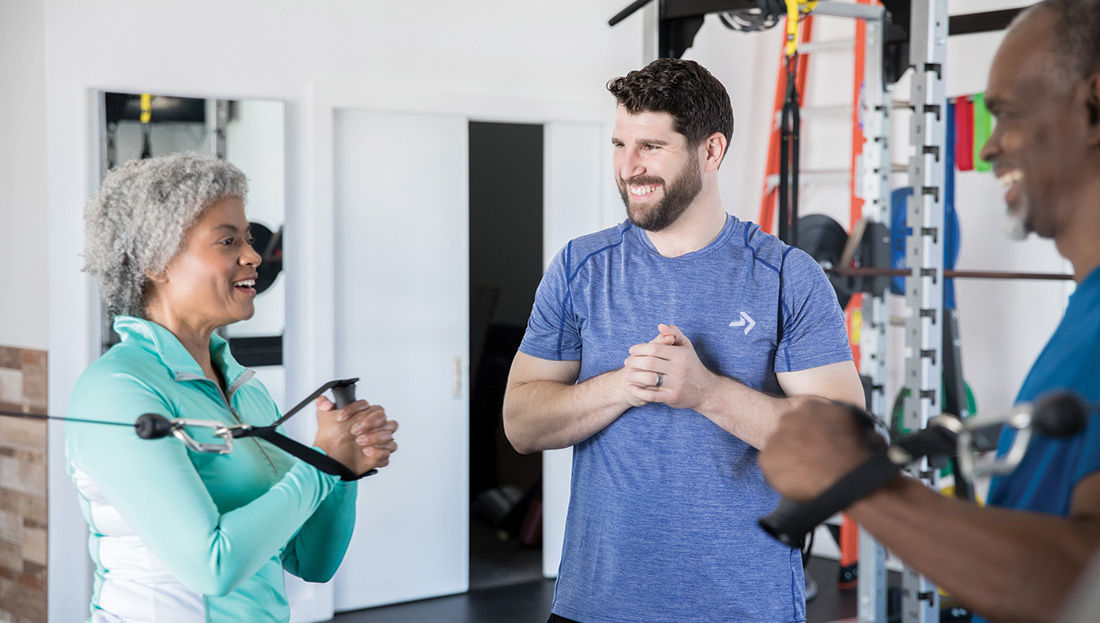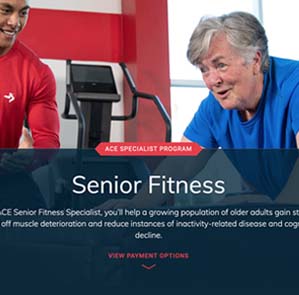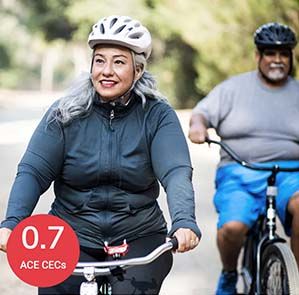
Could Working With a Health Coach Reduce an Older Adult’s Risk of Developing Alzheimer’s?

In an era in which Alzheimer’s disease has emerged as one of the most formidable challenges in the realm of public health, the quest for effective prevention strategies is more urgent than ever. Characterized by progressive cognitive decline and memory loss, Alzheimer's disease currently affects millions of individuals worldwide, casting a shadow of uncertainty and distress over aging populations. As researchers work to unravel the complexities of this neurodegenerative condition, the focus is gradually shifting toward innovative approaches in prevention and management.
One such approach that is gaining increasing recognition for its potential in altering the course of Alzheimer’s is health coaching. In fact, a new study suggests that personalized health and lifestyle change can be effective in delaying or even preventing memory loss for higher-risk older adults.
The Study
The two-year study compared cognitive scores, risk factors and quality of life among 172 participants, half of whom had received personalized coaching to improve their health and lifestyle in areas believed to raise the risk of Alzheimer’s, such as uncontrolled diabetes and physical inactivity. These participants were found to experience a boost in their performance on cognitive testing, amounting to a 74% improvement over the non-intervention group.
Improvements were also noted between the two groups in measurements of risk factors and quality of life, translating approximately to 145% and 8%, respectively, the researchers reported.
The study, known as SMARRT, for systematic multi-domain Alzheimer’s risk reduction trial, follows previous work from other researchers that has yielded contradictory results on the effects of health and lifestyle interventions. This study differed, though, in providing personal coaching that was customized to each participant.
“This is the first personalized intervention, focusing on multiple areas of cognition, in which risk factor targets are based on a participant’s risk profile, preferences and priorities, which we think may be more effective than a one-size-fits-all approach,” explains lead investigator Kristine Yaffe, MD, vice chair of research in psychiatry and professor in the University of California San Francisco departments of neurology, psychiatry and epidemiology and biostatistics. “Not only did we find a significant reduction in risk factors, this is one of only a few trials that has shown a benefit in cognition that likely translates to lower dementia risk.”
An earlier survey of 600 older adults revealed that most were concerned about Alzheimer’s disease and related dementias. “They wanted to know their personal risk factors and were highly motivated to make lifestyle changes to lower dementia risk,” says Yaffe, referring to her collaboration with co-lead investigator and co-author Eric B. Larson, MD, MPH, former vice president for research and health care intervention at Kaiser Permanente Washington.
Participants in the current study, as well as the earlier survey, were enrolled in Kaiser Permanente Washington and were between 70 and 89 years old. They had at least two of eight risk factors for dementia: physical inactivity, uncontrolled hypertension, uncontrolled diabetes, poor sleep, use of prescription medications associated with risk of cognitive decline, high depressive symptoms, social isolation and current smoking status.
The intervention participants met with a nurse and health coach and selected specific risk factors they wanted to address. They participated in coaching sessions every few months to review their goals, which ranged from tracking hypertension to walking a certain number of steps per day or signing up for a class. The meetings started in person and switched to phone calls during the pandemic.
Non-intervention participants were similar in age, risk factors and cognitive scores and received educational material on dementia risk reduction, which was mailed every three months.
Surprisingly, the pandemic did not seem to impact the intervention, despite the isolation that many people experienced during that time.
“We were pleasantly surprised that the positive results of the trial were not offset by the impact of the pandemic,” explains Larson, who is currently professor of medicine at the University of Washington. “We know that isolation from social distancing took a heavy toll on cognition, social lives, and mental and physical health in some older adults. But participants in the intervention group fared better cognitively and had fewer risk factors after the trial, during the pandemic, than they did before.”
Unlike anti-amyloid medications, which are a class of drugs designed to target and reduce amyloid plaques in the brain that are closely associated with Alzheimer's disease, risk-reduction programs are not costly, nor do they have strict eligibility criteria or require extensive monitoring for side effects, says Yaffe. “Hopefully, in the future, treatment of Alzheimer’s and related dementias will be like cardiovascular disease management, with a combination of risk-reduction and specific drugs targeted for disease mechanisms.”
What the Research Means to Health and Exercise Professionals
With Alzheimer’s disease ranking as the fifth leading cause of death in people over the age of 65 in the United States, it is no wonder it’s one of the most significant health concerns for older adults. It is anticipated that the number of cases worldwide will almost triple to 131.5 million by the year 2050. And each year, an additional 10 to 20% of older adults are diagnosed with mild cognitive impairment (MCI), which has the potential to progress to Alzheimer’s.
As a health coach or exercise professional, it’s important to recognize that the risk factors for cardiovascular disease, such as hypertension, high LDL (low-density lipoprotein) cholesterol, diabetes, obesity and physical inactivity, are also risk factors for dementia. That means that what is good for the heart is good for the brain, and what is bad for the heart is bad for the brain. Eating well, staying physically active, keeping stress levels low, maintaining a healthy weight—these are all general strategies that are good for both heart and brain and are the first steps toward preventing Alzheimer’s disease.
Clearly, the lifestyle habits that create good health are the same ones that can help reduce a person’s risk of developing Alzheimer’s, and, while there are important considerations to be aware of that are specific to older adults, as a health coach you have the skills and knowledge to help your clients make the necessary changes to not only improve health, but also reduce the risk of cognitive decline as well.
When working with older adults, or any client for that matter, it is important to understand what they are wanting to achieve. While it may be true that client needs and goals change with age, don’t make the mistaking of assuming you know what a client’s goals and needs might be. Rather, it is crucial to focus completely on what the client says they want the target of their behavior-change journey to be. As a health coach or exercise professional, use active listening to gain a deeper understanding of what a client is saying and, just as importantly, not saying. In other words, it is crucial that you listen to not only hear the words being said, but that you listen to understand the meaning behind what is being said.
To communicate effectively with your clients and better understand what they want to achieve by working together with you, consider the following tips:
- Attend to the client’s agenda and not your own.
- Ask powerful questions (that evoke discovery; promote insight, commitment and action; challenge assumptions; provide clarity; and move the client forward).
- Understand the client’s goals, values, concerns and beliefs about what is and is not possible.
- Pay attention to the words, tone of voice and body language your client uses.
- Use reflections and summaries to gain clarity and check for understanding.
- Encourage, accept, explore and reinforce feelings, beliefs, concerns, ideas and suggestions.
As more Americans cross the 65-year mark, your chances of working with clientele other than apparently healthy adults will undoubtedly increase. If you are interested in increasing your skills and knowledge of working with older adults, consider becoming a Senior Fitness Specialist and acquire the confidence and knowledge to meet the unique needs of senior clients and support and coach them to reach their health and fitness goals, which likely include reducing their risk of developing Alzheimer’s.
By providing personalized guidance, support and lifestyle interventions, health coaches and exercise professionals are ideally positioned to become key allies in the fight against Alzheimer’s. As we navigate the intricacies of Alzheimer’s, understanding its prevalence, impact, and the transformative power of health coaching is crucial in forging a path toward a future where the burden of this disease is significantly reduced.
Expand Your Knowledge
ACE Senior Fitness Specialist Program
The growing population of older adults is seeking to gain strength and vitality while warding off inactivity-related disease and cognitive decline—and you can help them achieve their goals. The NEW and IMPROVED ACE Senior Fitness Specialist Program will teach you how to safely and effectively help senior clients maintain vibrancy through health and fitness. You’ll discover a holistic approach to both body and brain health, combining rapport-building, behavior change, exercise programming, nutrition and cognitive health. Most older adults are impacted by some type of age-related chronic illness, injury or cognitive decline, so this specialized expertise will help increase your value and client pool.
Essentials for Training Older Adults – Course Bundle
The U.S. Census Bureau predicts that 83.7 million people aged 65 and older will be living in the United States by 2050, creating a high demand for trained professionals to help older adults focus on their health and fitness. From strength training and motivation to body and brain improvement, the Essentials for Training Older Adults – Course Bundle dives deep into improving your senior clients’ fitness and quality of life.

More Articles
- Certified™: February 2024
How Will Weight-loss Drugs Impact the Future of Fitness?
Contributor
- Certified™: February 2024
Get it Done! 4 Fast and Effective Workouts From ACE Experts
Contributor
- Certified™: February 2024




 by
by 



